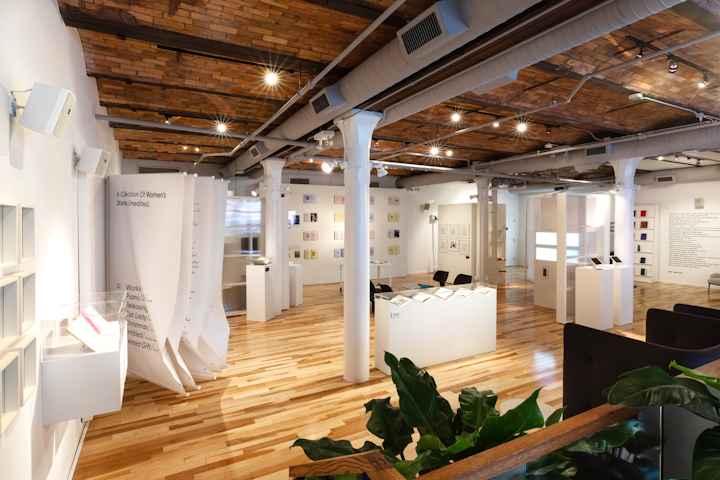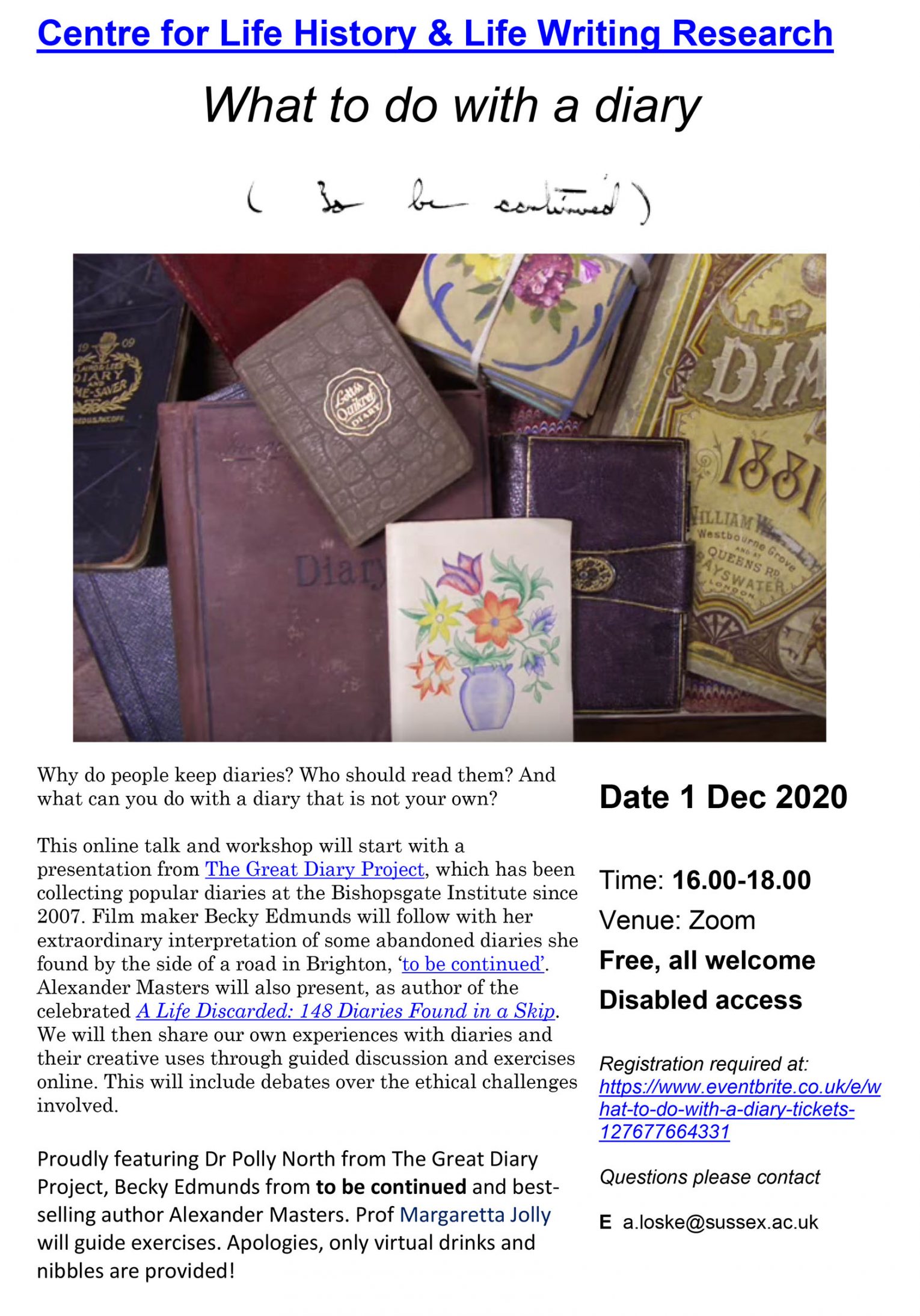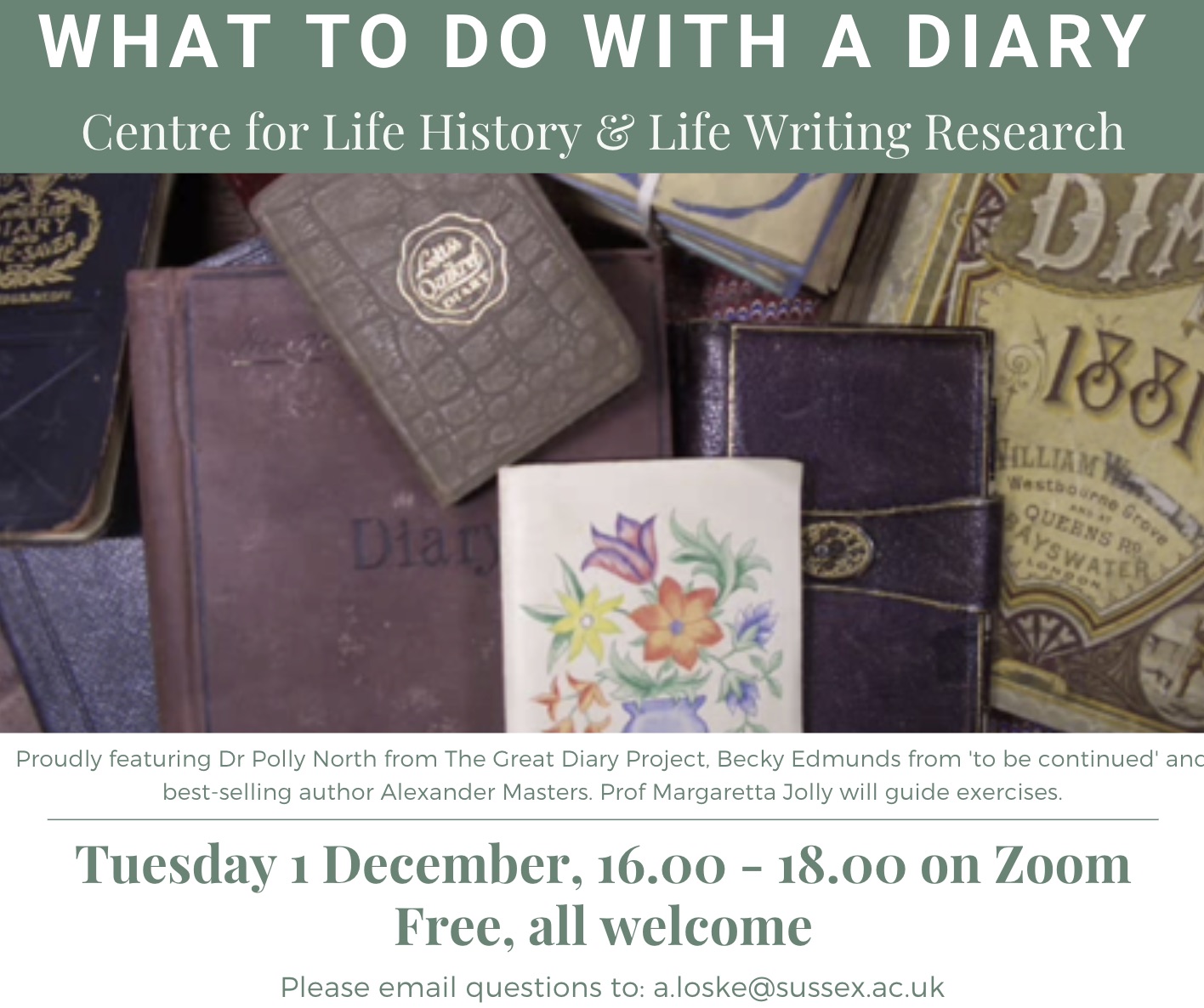A selection of the talks and exhibitions we have provided.
2023
The Great Diary Project Wed 29 Nov 2023 Time: 16.00-18.00
Venue: Fulton A University of Sussex
Why do people keep diaries? Who should read them? Discover the amazing The Great Diary Project, with director Dr Polly North.
This interactive presentation introduced the amazing The Great Diary Project, which has been collecting popular diaries at the Bishopsgate Institute since 2007 and whose archive stretches between 1700 and 2023. Dr Polly North, the Project co-founder and Director, spoke about the prosaic and profound interests of these texts, from the appointment diaries of a one-woman crusade against inadequate care homes to the beautifully illustrated diaries of a 19th century London restaurant-goer.
We then shared our own experiences with diaries, with an invitation to show and tell! This included debates over the ethical challenges involved.
Prof Andrew Hadfield and Prof Margaretta Jolly introduced and responded.
2020
2019
The Inspiration Rooms and HBO’s launch of Anne Lister Series

GDP were privileged to be a part of this exciting venture celebrating women all over the world.
A collection of women’s stories, in their voices, unedited.
2017
The Great Diary Project held an extraordinary exhibition at the : Inigo Rooms, Somerset House East Wing, 26 May – 7 July 2017, Weds–Sun, 11:00-5:30
@deardiaryexpo
#deardiaryexpo
‘DIARY OF AN EXHIBITION’ CAN BE FOUND HERE
Co-curated by Dr Polly North, director of the Great Diary Project and Professor Clare Brant, director of the Centre for Life-writing Research, Dear Diary celebrated diaries and the ways in which diarists capture human experience. Revealing the extraordinary and the everyday in individual lives, diaries stage important issues for the individual and society. Diaries are a profoundly personal springboard into some of the 21st century’s most crucial questions, including how do we identify, understand, portray and share aspects of ourselves?
Forms of diary have for millennia been a cornerstone of self-examination. Over 1,800 years ago, Marcus Aurelius was asking himself: Who am I? Am I good? Twenty-first century diarists ask themselves the same questions. This exhibition is about the personal experience of living day-to-day: what it is to think, feel and experience in the world. The exhibition show-cases hundreds of personal entries that were made on paper, in apps and on devices. It is through these records that we step into the shoes of others and in rendering their reality recognise and better understand our own.
Diaries can be confession, therapy and aide memoire. They are also used as appointment books and historical or medical resources. The diarist may use the diary as private refuge, a place where only he or she can be judged, or as a mental gymnasium in which to work out ideas. Diaries, and the narrative pattern they encourage, have been described as a forum in which individuals can claim and shape identities and as a cipher or filter for the influences that perhaps act upon individuals.
Diaries have been described as an important tool with which to mediate the gaps between what we think we are and what we find ourselves, in practice, to be. The ways in which we remember and narrate our lives connects with how we feel and behave.
In the exhibition, we saw how refugees’ written and video diaries are used to restore a sense of voice and even agency. The diaries are important eye-witness accounts, preserved for future generations, in which the minutiae of a single person’s lived experience can count for more, or as much as, a journalist’s report or the history text-book.
Dear Diary charted some of the ways in which paper diaries have been joined by phones and iPads as our means of keeping track of daily life. Specially-commissioned film interviews with living diarists, by artist Derek Eland, reveal how diaries are meaningful to people now. Diarists’ lived experiences differ. However, all diarists seem to share a full complement of the sorts of doubts and beliefs which have since fascinated successive generations. It is the disparity between the eras from which the diaries in the exhibition are drawn that makes their similarities so instructive, not to say poignant. And it is the differences between diarists that add piquancy to their similarities: diary-writing practice and diaries can help us all in greater understandings of ourselves and others.
The exhibition was a collaboration between King’s College London’s Centre for Life-Writing Research and The Great Diary Project, supported by the Department of English and presented by Cultural Programming at King’s. It also draws on the expertise of the European Research Council funded Ego-Media research group at King’s, which investigates life writing in the digital age.
King’s College London would like to thank all the galleries and individuals who so generously lent and contributed to the exhibition.
The exhibition was devised by Professor Clare Brant, King’s College London and Dr Polly North, The Great Diary Project.
Designed by Mr Gresty (Studio). Films by Derek Eland and Jonah Klein. Editing by Scott Smith, Rob Gallagher and Arko Højholt. Photography by Rachel Smith and Yeshen Venema. DiarApp by Nikita Vorontsov. Music by Sam Jackson. Content contributed by Alex Belsey, Rob Gallagher, Ailsa Granne, Mikka Højholt, Rachael Kent, Frances Long and Rebecca Roach.
2014

Great Diary Project at the Museum of Childhood
17 May – 12 October 2014
Using documents from The Great Diary Project archive at Bishopsgate Institute, this exhibition offers insights into the lives of children and teenagers at particular moments in history. The diaries on display date from 1813 to 1996, showing changes in attitudes over time and demonstrating how an individual’s unique voice can be captured in this very private kind of writing.
On public display for the first time, they include tales of flogging and bed bugs at boarding school during the Napoleonic Wars, early twentieth century American Scout diaries, as well as coded accounts of wild teenage behavior during the Blitz.
See more at: Museum of Childhood Website


